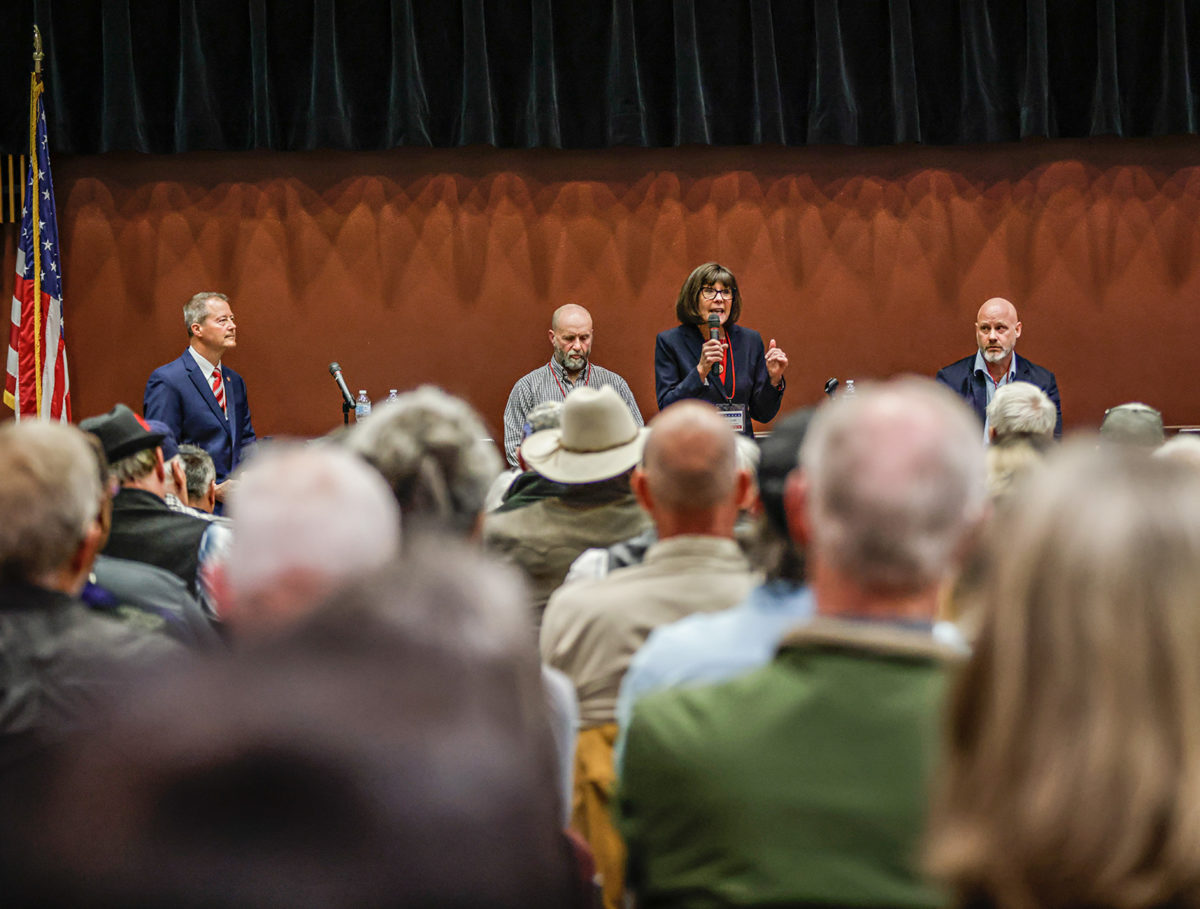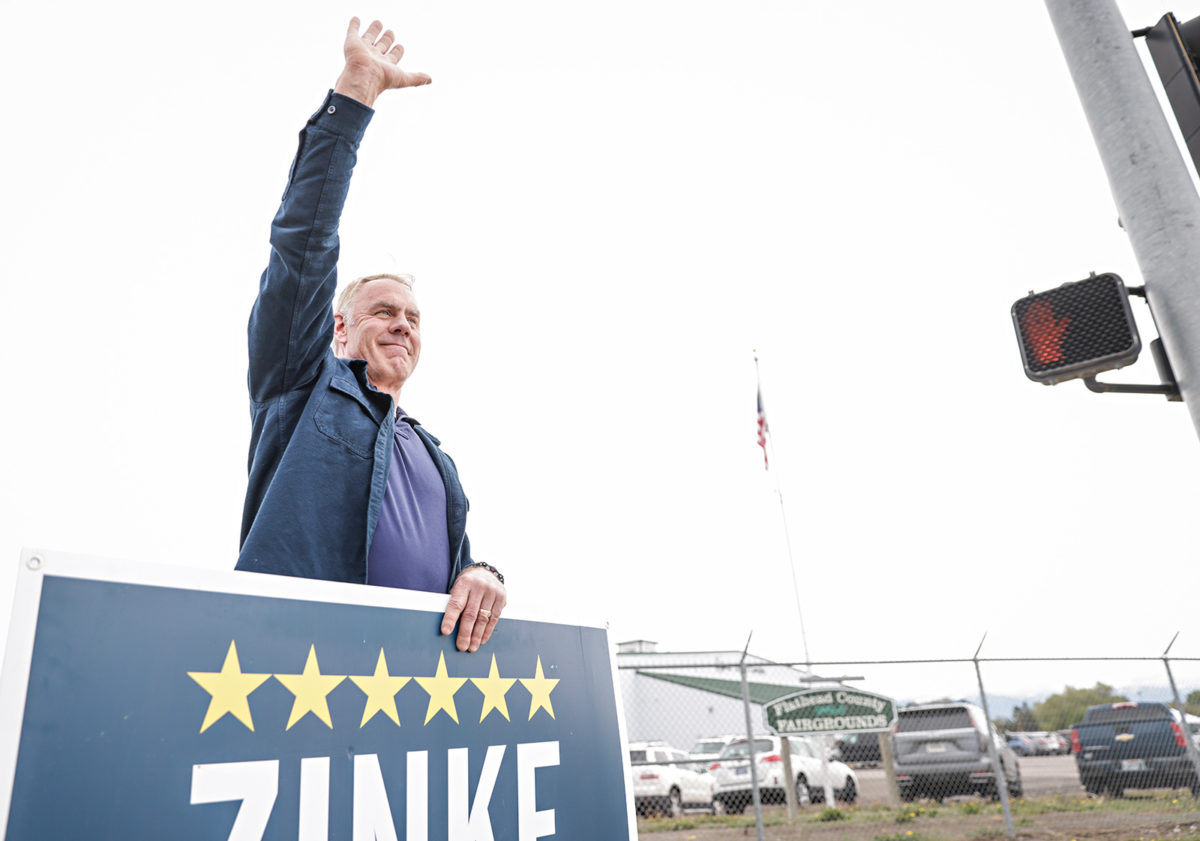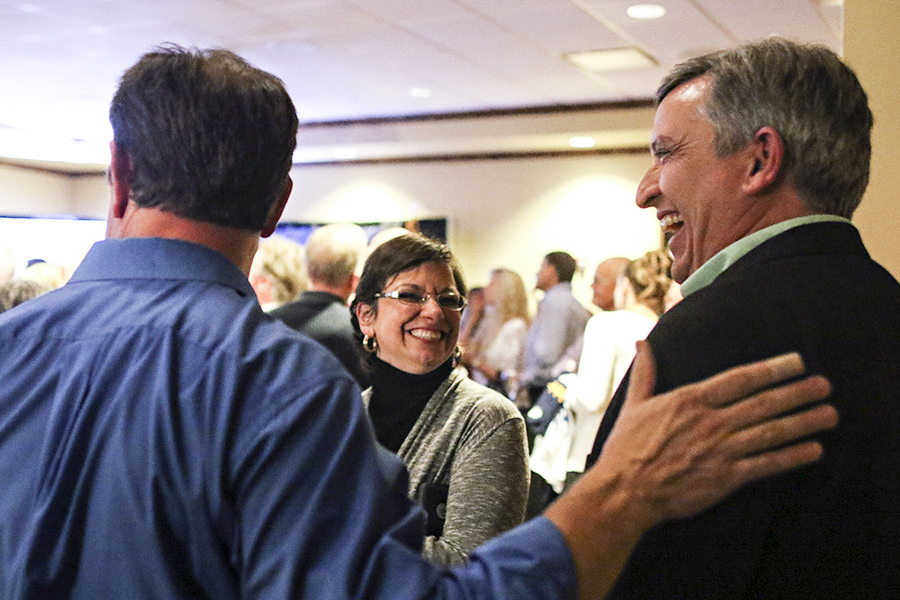A United Front?
Having narrowly defeated his Republican challenger while gathering tepid support on his home turf, Ryan Zinke looks to alloy his base; meanwhile, a combative primary in the Flathead revealed a splintered GOP caucus with fences to mend
By Tristan Scott
On the Saturday morning after Montana’s June 7 primary election, Ryan Zinke plucked weeds from his neatly trimmed patch of lawn west of downtown Whitefish, reflecting on his success in a nail-biter Republican contest that, nearly 48 hours after the polls closed, saw him inducted as the GOP’s candidate for a newly drawn western congressional district. A win is a win, Zinke said, even if it was harder fought than he anticipated and even if he was beaten on his home turf, losing Flathead County, the district’s conservative nerve center, to his nearest competitor by 17 percentage points.
The cluster of campaign signs that adorned Zinke’s yard during the midterm primary election cycle had been removed by the weekend — including a placard supporting the valley’s lone elected Democrat, Dave Fern — and their absence allowed his green grass to absorb a rare swatch of uninterrupted sunlight amid what has otherwise been a cool, wet debut to summer in the Flathead Valley, where Zinke grew up.
Whether Zinke still lives here has been the subject of a jet stream of political rhetoric from Democrats and Republicans alike, with the former taking aim at the one-time congressman and Interior Secretary as a corrupt interloper and byproduct of the Trump administration, and the latter branding him as an out-of-touch Washington insider, with diluted conservative credentials to boot.
“I had the Democrats lobbing mud at me from one side and then I had all my Republican opponents hog-piling me from the other, so the cumulative effect was this giant snowball of malicious political rhetoric, none of which was true,” Zinke said, adding that he might have pushed back earlier and rejected the premise that he resides in California, where he says his wife inherited family property and recently claimed residency for tax purposes. “She has a Montana driver’s license and raised our kids here, but I’m supposed to go on the defensive. These negative campaigns are getting more effective and, in this case, it was amplified by both Democrats and Republicans.”
Indeed, the vitriol oozing from within the ranks of Zinke’s own party was never more evident than at an April 19 debate between four of the five congressional candidates seeking the Republican nomination. Hosted by the Flathead County Republican Central Committee (FCRCC) and held at the Flathead Valley Community College in Kalispell, Zinke was the only candidate not in attendance, opening a mile-wide lane for his opponents to launch unbridled attacks.
“Where is Ryan Zinke?” Al “Doc” Oszewski, an orthopedic surgeon from Kalispell, exclaimed in his introductory remarks. “We elect our representatives. They are not coronated by Washington D.C. insiders or bought by special interests. So where is Ryan Zinke, the only other candidate [besides me] with a voting record?”

A former state legislator who has twice run unsuccessfully for statewide office, Olszewski was the second-best known candidate running for Montana’s new western congressional district, which the state gained back after losing it in the 1990 Census. He maintained his conservative record made him the “best fit” to join fellow “Trump conservative” U.S. House Rep. Matt Rosendale in Congress, where the state’s at-large congressman cruised to re-election in what is now the eastern congressional district. Since being elected in 2020, Rosendale has aligned himself closely with an ultra-conservative faction of House representatives known as the Freedom Caucus, which Olszewski aggressively courted since announcing his candidacy for the new district.
At the April debate, Olszewski repeated baseless claims of fraud surrounding the 2020 election, including claims that Chinese software companies and the liberal financier George Soros hacked into machines manufactured by Dominion Voting Systems to flip votes away from Trump.
In contrast, Zinke, widely viewed as the frontrunner since the moment he announced his candidacy — due both to name recognition and a giant fundraising gap — has been portrayed by his fellow Republicans as too moderate, despite an endorsement from former President Trump in his back pocket. It’s a new political dimension that reveals just how sharply the GOP has shifted to the right, both nationally, statewide and in Flathead County.
For example, even though Zinke’s campaign staff notified the staunchly conservative FCRCC five weeks in advance that scheduling conflicts prevented him from participating in the debate, the raincheck registered as arrogance when a Zinke staff member RSVP’d with what committee members perceived as a dismissive tone.
“As you know, this is not a competitive primary (despite what a few squeaky wheels say) so we want to make sure high-profile events like this are all around good for the party’s collective efforts and unity to power us all to victory in November,” Zinke staffer Heather Swift wrote to FCRCC Chair Ronalee Skees, proposing a mid-May event as an alternative.
Zinke also missed a May 14 debate sponsored by the Montana Shooting Sports Association in Missoula, where he was again the only candidate missing from the five-member slate — an absence Zinke’s campaign maintains was once again the result of a scheduling conflict and not political strategery.

However, the debate happened to occur on the same day as the mass shooting in Buffalo, New York, and the issue of gun control figured prominently into the forum. Olszewski and GOP candidate Mary Todd hewed to the right when discussing gun control measures, according to the Lee Newspapers State Bureau, opposing gun-free zones in schools, red flag laws and a national gun registry. Both candidates are also on the record calling for the abolishment of the Bureau of Alcohol, Tobacco, Firearms and Explosives (ATF) and the repeal of the National Firearms Act of 1934 (NFA). Given the context, it would have presented a plum opportunity for either challenger to portray the retired Navy SEAL as soft on the Second Amendment.
“I am not sure it’s a good idea for me to get in the ring with people who just want to attack me and won’t say anything about what they hope to accomplish in terms of policy objectives,” Zinke said. “Call me crazy, but quite frankly I don’t think buying automatic machine guns at Walmart is a good idea. But that’s been the theme of some of these forums.”
Rob Saldin, a Wood Johnson Scholar at Harvard University and assistant professor of political science at the University of Montana, said it’s becoming more common for frontrunner candidates to steer clear of the forums, particularly when lesser-known candidates can commandeer the debate stage as an attack platform.
“Although he’s not technically an incumbent, Ryan Zinke has all the credentials of one, so it makes sense for him to want to avoid a debate stage with his opponents where it would basically be open season on him,” Saldin said, adding that, strategically speaking, it wasn’t a conceit for Zinke to assume he had a clear path to the general election. “Zinke had all the advantages of an incumbent, he had massive fundraising advantages, he had the Trump endorsement, he had his prior service in Congress, so I have to believe he’s reflecting on how the race became so tight.”
Saldin speculated that Zinke’s major disadvantage can be traced back to his tenure in Congress (2015-2017) and his stint as Trump’s Interior Secretary, a job from which he resigned in 2019 amid ethics investigations. The residual baggage, Saldin said, may have left voters with the sense that Zinke’s “a bit of a grifter.”
“Taken in sort of a piecemeal fashion, there’s perhaps nothing that rises to the level of egregious, but the cumulative effect is the impression that Zinke plays fast and loose, that the rules don’t really apply, and that he’s above the law,” Saldin said. “That may have finally sunk in with voters.”

For Zinke’s part, he views the primary outcome not as a wake-up call, but as an indication of how disjointed the local Republican Party has become.
“There is certainly a tension within the Republican Party,” Zinke said. “There are opposing forces separating the traditional conservatives from the Freedom Caucus, there’s influence from the John Birch contingent creeping into some quarters. I do think the party in the Flathead Valley has moved to the right, I think the Bitterroot Valley has moved to the right, and then there’s the factor of people resettling the Flathead Valley who lean Republican but who don’t know me. And if you don’t know me, you’re going to come in and all you hear is ‘this guy is a bad, he doesn’t like guns, he doesn’t obey the law, he doesn’t protect children.’ It gets more and more outrageous and if you don’t know me those negative campaigns are pretty effective.”
Indeed, the Flathead Valley featured a loaded roster of down-ballot Republican primary races between candidates representing both ends of a textured GOP spectrum. They included crowded contests for several legislative districts, as well as a tight race for a seat on the county commission and a neck-and-neck race for a Public Service Commission (PSC) district that includes Flathead and Lake counties between Derek Skees, a longtime conservative legislator, and Annie Bukacek, an anti-abortion, anti-vaccine activist and former member of the Flathead City-County Board of Health whose base (as well as tens of thousands of dollars of her own money) helped her gain an 87-vote lead over Skees, who as of press time was still weighing whether or not to pursue a recount.
“The 11th Commandment of the Republican Party is, after a bitter primary election, we circle the wagons and support the party,” Skees said. “And I was prepared to concede. But I’ve gotten so many texts and calls from my constituents saying I need to ask for a recount that I want to explore my options. Because if Dr. Annie gets elected, I think the real Montana conservatives are going to be tweaked.”

Skees is married to Ronalee Skees, the FCRCC chair who lost her own primary bid for House District 11, a legislative seat representing Lakeside that Derek Skees vacated to run for PSC District 5. Her challenger, Tanner J. Smith, who owns a construction company and serves as a trustee on the local school board, ran a successful campaign in part by accusing Skees of supporting COVID-19 mitigations in her role on the Flathead City-County Health Board, which in March 2020 passed a directive to close gyms, restaurants and bars, but resisted mitigations at every other turn. The board’s lone vote against the March directive was Bukacek.
Reflecting on her own loss, Ronalee Skees emphasized the need to coalesce, even though the GOP committee she chairs endorsed a bloc of conservative candidates and urged voters not to support several Republicans they labeled as too moderate, all of whom won or maintained a lead as of press time.
“Looking at our party locally and across the state, I think there are three groups struggling against each other under one big tent,” Skees said, explaining that she was not privy to the FCRCC’s vetting committee that endorsed candidates this election cycle and did not agree with its decision to disavow certain Republicans. “There are Democrats who run as moderate Republicans because their own party has gone too far left; there are conservative Republicans like me and Derek and there is another segment that is pushing even further right. And we’re in this tight struggle with each other. As a Republican, I want to fight against socialism, not against other Republicans.”
As Republicans forge a path forward to the general election that favors the GOP, despite Democrat congressional candidate Monica Tranel’s landslide victory in the primary, Skees said it’s critical to set aside differences within the caucus and to present a “united front.”
“I truly want the Flathead County Republicans to come together,” she said. “It’s like having Thanksgiving dinner after a divorce. We have to come together as one big, strong family.”
Courtenay Sprunger, a local business owner, former chamber of commerce chair and fifth-generation Flathead resident, was among the candidates the FCRCC undermined in its endorsements. Still, she won her bid for the Republican nomination to represent House District 7 in the Montana Legislature, a seat that encompasses downtown Kalispell and which is currently held by Frank Garner, the city’s former police chief who cannot run again due to term limits, but who endorsed Sprunger in her quest to succeed him.
“We can only accomplish great things if we work together as a team, and my priority is to do great things for this community,” Sprunger said. “I think we have to work together to get things done, and I believe we are better together. Getting things done is my priority, whether that’s helping hard-working residents find housing, or working on solutions to ease the rising traffic counts and improve infrastructure, or helping curb the local spike in crime. Whatever happened in the past to divide us, we just need to leave it in the past.”
For Zinke, who described the Republican Party as “circling the wagons and shooting in,” it’s time to present a united front.
“The focus now has to be to mend the wounds, because there are always wounds after a primary,” he said. “In a lot of ways primaries are more vicious, because you are looking at a conservative Republican base on several different paths. But right now, I’m going to take the path that is best for Montana.”